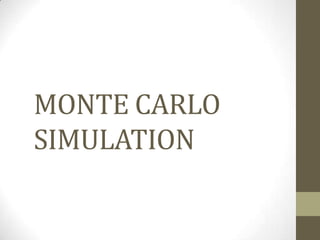
Monte carlo simulation
- 2. MONTE CARLO SIMULATION • A problem solving technique used to approximate the probability of certain outcomes by running multiple trial runs, called simulations, using random variables. • The technique is used by professionals in widely disparate fields such as • Finance • Project management • Energy, manufacturing • Engineering • Research and development • Insurance • oil & gas and the environment.
- 3. HISTORY • Monte Carlo simulation was named after the city in Monaco. • The technique was first used by scientists working on the atom bomb.
- 4. HOW MCS WORKS • In Monte Carlo simulation, the entire system is simulated a large number (e.g., 1000) of times. Each simulation is equally likely, referred to as a realization of the system. For each realization, all of the uncertain parameters are sampled (i.e., a single random value is selected from the specified distribution describing each parameter). The system is then simulated through time such that the performance of the system can be computed. This results is a large number of separate and independent results, each representing a possible “future” for the system. The results of the independent system realizations are assembled into probability distributions of possible outcomes. As a result, the outputs are probability distributions.
- 5. EXAMPLE: ROLLING DICE • As a simple example of a Monte Carlo simulation, consider calculating the probability of a particular sum of the throw of two dice (with each die having values one through six). In this particular case, there are 36 combinations of dice rolls:
- 6. • Based on this, We can manually compute the probability of a particular outcome. For example, there are six different ways that the dice could sum to seven. Hence, the probability of rolling seven is equal to 6 divided by 36 = 0.167. • Without computer, we could throw the dice a hundred times and record how many times each outcome occurs. If the dice totaled seven 18 times (out of 100 rolls), we would conclude that the probability of rolling seven is approximately 0.18 (18%).
- 7. • But Better than rolling dice a hundred times, we can easily use a computer to simulate rolling the dice 10,000 times (or more). Because we know the probability of a particular outcome for one die. The output of 10,000 realizations:
- 8. HOW THE RESULTS ARE ACCURATE • The accuracy of a Monte Carlo simulation is a function of the number of realizations.
- 9. ADVANTAGES • Probabilistic Results: Results show not only what could happen, but how likely each outcome is. • Graphical Results: In Monte Carlo simulation , it’s easy to create graphs of different outcomes and their chances of occurrence. • Sensitivity Analysis: In Monte Carlo simulation, it’s easy to see which inputs had the biggest effect on results.
- 10. APPLICATIONS • Physical Sciences • Engineering • Computational Biology • Applied Statistics • Games • Design and visuals • Finance and business • Telecommunications • Mathematics